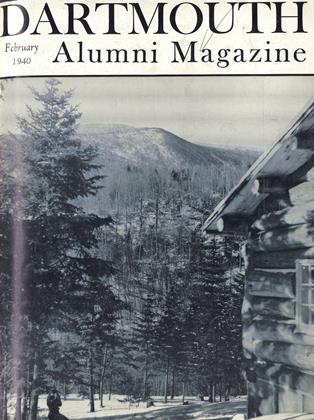AUDIENCE TAKES LUSTILY TO CRITIC'S ROLE FOR EXPERIMENTAL THEATRE
A CTIVITY IN THE Experimental Theatre has reached a peak in the past two years under Ted Packard's direction, so that the Players now present about as many plays of an unusual, poetic or otherwise experimental nature as they do of the usual box-office productions. So in addition to the recent highly-successful Our Town and the much-anticipated Carnival production of Twentieth Century, there have been some good experimental shows in Robinson Hall, including TheGreat Magician, a Commedia dell' Arte play presented January 17 and 18.
One of the nicest things about the Experimental Theatre is that the spectators are not only invited but required to throw (a) bouquets or (b) brickbats at the actors, the director, the author, the scene-designer and the fellow who leaves the radiator on. Everyone seems to take to this indoor sport with great ease and agility, which may prove that the critic lies hid in every soul, or only that people want to be invited to come again.
The unusual thing is that despite this unparalleled opportunity for anonymous invective (the names are detached from the criticisms as soon as they come into the Players office) most of the people say nice things—at least they did about MyHeart's iti the Highlands, the November show. They also say funny things, dull things, profound things and things like this, by a man who eats Wheaties:
"Favorite scene: The locomotive-, storm-, for-rent-, rejection-slip-, Walpurgian-, smashing-, rattling-, comingapart- putting together again scene somewhere between two damns."
The contestants write their criticisms under these headings: "Did you enjoy the show? Mention merits and defects of this work as a piece of play writing. What is your opinion of the selection of this play for production? Do you feel the scene design contributed to the best interpretation of the play? Comment on 1. acting, 2. staging." The answers in this case run from heel-clicking praise to long-faced panning. The gusty writer quoted above also said of "merits and defects": "It's Saroyan. Stein is Stein; Joyce, Joyce. A flower by any other name wouldn't smell as woodsy," but another wrote: "Certainly a play ought to let the audience get some idea of what it's about. This did not in any way that I saw."
Opinion of author William Saroyan was divided very sharply, more so than opinion on acting, staging and lighting, which were mostly praised. There were some nice things said about the off-stage geese, too. But Saroyan stirred up intense admiration or violent confusion: "Saroyan may not be a genius, but for my money he can do until one comes along He has the faculty of catching the warm human overtones, as few people writing for the theater in our generation have"; on the other hand: "Wish I could have my evening back."
Wrote one: "It is a triumph in getting beneath social and intellectual sophistication and snobbishness to a genuine common humanity on the basis of which whatever neighborliness and democracy there is or ever will be must be founded It is a daring, thin-line-dancing play, with a serious and socially creative attitude lightly presented. It skirts the preposterous but leaves a feeling of genuineness. And the slightly too easy play of the finer and simpler human qualities is very nearly made good by the paying by the main characters of the price of their poetic irregularity." Someone should give a medal.
Suggestions were offered on all phases of direction, staging, acting and sound-effects; some said this was fine, others called it "a contest in ineptitude." "Rotten play" from this one; "I forced a second admission" from that one.
Which, as the man said, is what makes horse races
 View Full Issue
View Full Issue
More From This Issue
-
 Article
ArticleMore Than Professor
February 1940 By JOHN HURD JR. '21 -
 Article
ArticleThe College In The Sixties
February 1940 -
 Class Notes
Class Notes1915*
February 1940 By CHARLES R. TAPLIN -
 Article
ArticleEducation Without Books
February 1940 By Davis Jackson '36 -
 Sports
SportsBig Green Teams
February 1940 By Whitey Fuller '37 -
 Article
ArticleHanover Browsing
February 1940 By HERBERT F. WEST '22
Article
-
 Article
ArticleAlumni Fund Passes $175,000
June 1945 -
 Article
ArticleA Wah Hoo Wah for –
December 1957 -
 Article
ArticleWHAT PRICE DEDICATION?
APRIL 1959 -
 Article
ArticleThree Filmstrips Available to Clubs
OCTOBER 1966 -
 Article
ArticleCommencement on the Green and a Campaign Victory Lap
SEPTEMBER 1996 By "E. Wheelock" -
 Article
ArticleThe Cutting Edge
July | August 2014 By Rianna P. Starheim ’14

